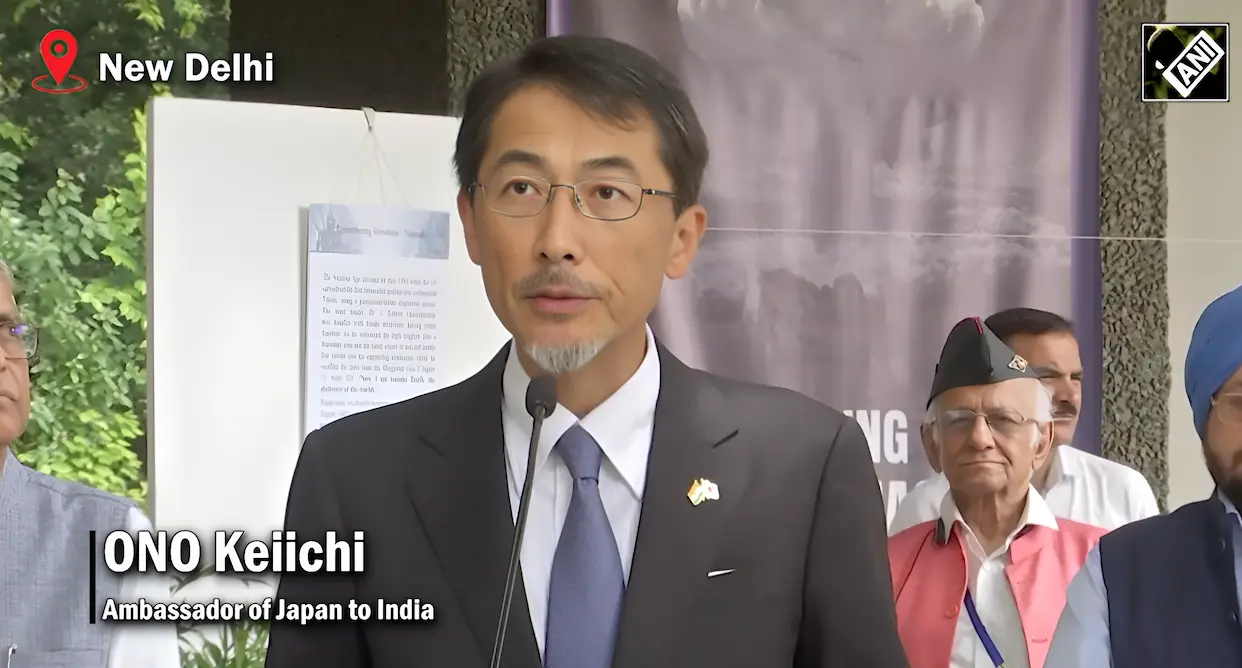
India’s Parliament observed Hiroshima Day with a two-minute silence, continuing a 40-year tradition (photo videograb ANI)
Hiroshima Day Tribute – In a deeply moving moment of international solidarity, India’s Lok Sabha observed a solemn tribute to the victims of the atomic bombings of Hiroshima and Nagasaki, marking the 80th anniversary of the tragedy that forever changed the course of history. The gesture, which included a two-minute silence, was not just symbolic, it was historic. According to Japan’s Ambassador to India, Ono Keiichi, India is the only country in the world that has consistently honoured this moment of remembrance in its Parliament for the past 40 years.
A Tradition of Compassion: India’s Parliamentary Tribute
On August 6, 2025, Speaker Om Birla led the Lok Sabha in observing a two-minute silence to honour the lives lost in the atomic bombings of Hiroshima and Nagasaki in 1945. The tribute, held at the start of the parliamentary session, was accompanied by a reaffirmation of India’s commitment to a world free of nuclear weapons.
“This House reiterates its commitment to a world free of weapons of mass destruction and resolves to work collectively to eliminate nuclear weapons and ensure peace and harmony,” said Speaker Birla.
The solemnity of the moment stood in stark contrast to the usual political debates and disruptions that characterize parliamentary proceedings. It was a rare instance of unity, reflection, and global empathy.
Japan’s Response: A Heartfelt Thank You
Japan’s Ambassador to India, Ono Keiichi, expressed profound gratitude for India’s unwavering compassion. Speaking at a commemorative photo exhibition held at the India International Centre in New Delhi, he said:
“The moment of silence has been observed almost every year for 40 years since 1985. I believe that India is the only country that continues this practice to this day. I would like to express my sincere gratitude to the people of India for their unwavering compassion for the victims in both cities over such a long period.”
The exhibition, which showcased haunting images from Hiroshima and Nagasaki, served as a powerful reminder of the human cost of nuclear warfare. Ambassador Keiichi emphasized that Japan, as the only country to have suffered atomic bombings during war, continues to advocate for a world without nuclear weapons.
Historical Context: India’s Legacy of Peace
India’s commitment to nuclear disarmament is not new. In 1957, then Prime Minister Jawaharlal Nehru became the first foreign leader to visit Hiroshima after the bombings. His visit was a powerful gesture of solidarity and a call for peace.
More recently, in May 2023, Prime Minister Narendra Modi visited Hiroshima during the G7 Summit. He laid flowers at the Hiroshima Peace Memorial and unveiled a bust of Mahatma Gandhi—donated by India to the city. The symbolism was clear: India stands for peace, remembrance, and the rejection of nuclear violence.
Global Significance: A Message Beyond Borders
The Lok Sabha’s tribute comes at a time when global tensions around nuclear weapons are rising. With renewed rhetoric from nuclear powers and stalled disarmament talks, India’s gesture serves as a moral compass.
“The message to today’s generation, who will be leaders tomorrow, scientists tomorrow, diplomats tomorrow—remains the same: ‘Never again,’” said Rakesh Sood, India’s former Ambassador to the UN Conference on Disarmament.
India’s consistent observance of Hiroshima Day in Parliament is not just a domestic tradition, it’s a global statement. It reflects a nation’s resolve to remember, to empathize, and to lead by example.
The Power of Memory: Why It Matters
The atomic bombings of Hiroshima and Nagasaki claimed over 210,000 lives and left countless others with lifelong injuries and trauma. Survivors, known as hibakusha, have spent decades sharing their stories to ensure the world never forgets.
India’s tribute honors these voices. It acknowledges that peace is not just the absence of war—it is the presence of memory, compassion, and collective responsibility.
“Even those who survived have had to live with indescribable suffering,” Ambassador Keiichi reminded attendees. “India’s empathy helps us carry that burden together.”
Politics and Peace: A Moment of Unity Amid Discord
Interestingly, the tribute in Lok Sabha was briefly overshadowed by political protests. Opposition members demanded the Prime Minister’s presence during Question Hour, leading to disruptions and adjournments. Yet, the Hiroshima tribute stood apart, untouched by the usual partisan clashes.
This contrast highlights the power of remembrance to transcend politics. For a brief moment, the House united in silence, reflecting on a tragedy that belongs to all humanity.
The Exhibition: A Visual Journey Through History
The photo exhibition inaugurated by Ambassador Keiichi featured rare archival images from Hiroshima and Nagasaki. It was attended by students, diplomats, and peace activists. The visuals—charred buildings, injured civilians, and haunting landscapes, offered a visceral understanding of the bombings’ impact.
The Ambassador signed the visitors’ book with a hopeful message:
“May the world without nuclear weapons be realized.”
Hiroshima Day Tribute – Final Thoughts: India’s Role in a Peaceful Future
India’s consistent tribute to Hiroshima and Nagasaki is more than ceremonial, it’s a reflection of its identity as a nation committed to peace, empathy, and global responsibility. In a world grappling with conflict and division, such gestures matter.
As Ambassador Keiichi said, this tradition connects the hearts of Japanese and Indian people, two nations that understand the value of peace and the cost of its absence.
In remembering Hiroshima, India doesn’t just honour the past, it shapes the future.
Also read –
Ethical AI Reimagined: India and Japan Forge a “Third Path” for Global Innovation
1 thought on “Japanese Envoy Lauds Lok Sabha’s 40-Year Hiroshima Day Tribute: “India Is the Only Country…””
Comments are closed.